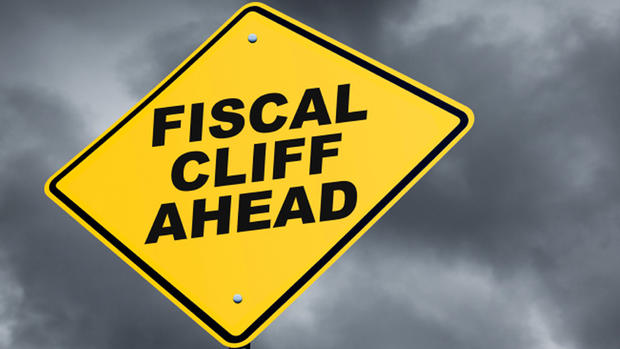Polls: Americans concerned about fiscal cliff
As lawmakers begin efforts this week to work out a deal for tackling the so-called "fiscal cliff," a couple of new polls suggest that even while Americans believe it's critical Congress and the President reach a timely compromise on the issue, many remain skeptical about their ability to do so.
The "fiscal cliff," a combination of tax increases and spending cuts scheduled to go into effect January 2013, threatens to plunge the U.S. economy back into recession if left untended, according to many economists. The controversial Bush-era tax cuts are set to expire at the end of the year, and January 1, 2013 also marks the day when $1.2 trillion worth of budget cuts, which cut across domestic programs and the Pentagon, begin to go into effect unless Congress can reach a deal to offset them. On the same day, a payroll tax cut will expire, as will a deferment of payment cuts to Medicare physicians.
According to a new USA Today/Gallup poll, 49 percent of Americans believe it's "extremely important" the cliff be averted, and 33 percent say it's "very important." Large majorities of both Republicans, independents, and Democrats all say it's important the nation doesn't go over the cliff.
A new Pew Research Poll sheds some light into voters' cause for concern: Most see the fiscal cliff not only as a threat to the U.S. economy, but also as an event that will negatively impact their personal finances. Sixty-eight percent of Pew respondents said that allowing the spending cuts and tax hikes to go into place would have a "major effect" on the U.S. economy - and 62 percent that effect would be "mostly negative." Forty-four percent said going over the cliff would majorly impact their own financial situation, and most - 60 percent - predicted that impact would be a negative one.
Despite the perceived consequences that many Americans believe would result from a protracted stalemate over the impending economic debates, few have much faith that Congress, which returns for the lame duck session today, will reach an agreement by the end of the year, according to the polls.
More than half - 51 percent - of Pew respondents said they do not think President Obama and Republicans in Congress would be able to reach an agreement, while 38 percent predict they will. If a deal is not reach, the study suggests, the GOP will absorb much of the blame: 53 percent say they'll blame Republicans in Congress if action is not taken, while 29 percent would lay the fault on Mr. Obama, 10 percent would place responsibility on both, and 2 percent would blame neither.
Asked which party they think will compromise more in the negotiations, Gallup respondents pointed to the very real possibility that neither side would give ground, as happened with the so-called "supercommittee" negotiations that led to the fiscal cliff in the first place: 15 percent of national adults said Republicans would compromise more, 21 percent said Democrats will compromise more, 26 percent said both sides would compromise equally, and 34 percent said neither will compromise.
Even while they express concern over the fiscal cliff, however, many Americans say they don't exactly know what will happen if the nation goes over it: According to Pew, 26 percent say they understand its economic impacts "very well," 32 percent say they understand it "fairly well," 23 percent say "not too well," and 17 percent say "not well at all."
According to Gallup, only about a third of national adults - 31 percent - say they're paying attention "very closely" to the situation, while 40 percent say they're following it "somewhat closely."

